Malala Yousafzai
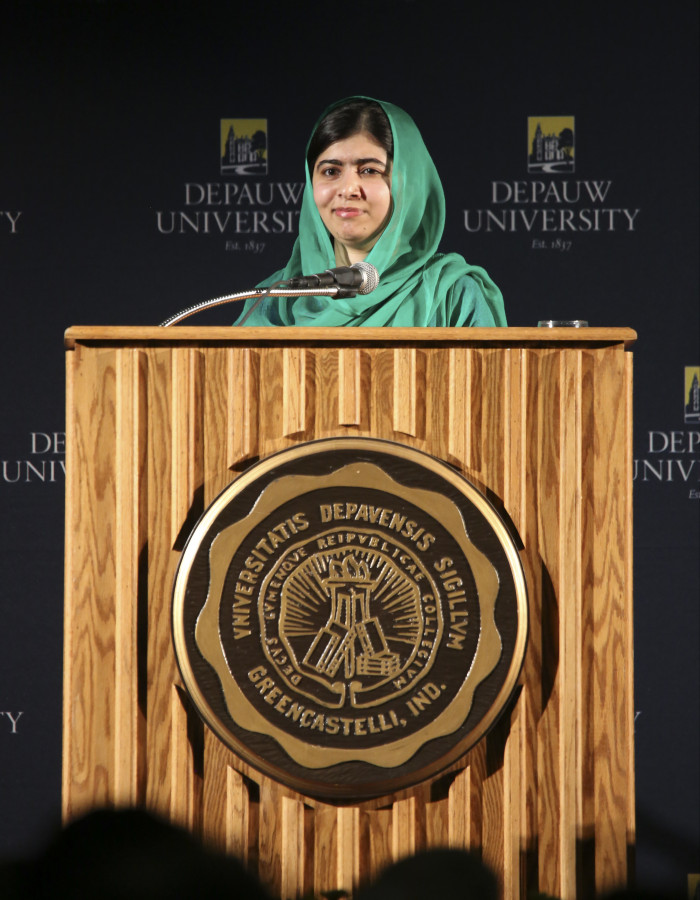 As citizens of the world, Malala Yousafzai says, "I think the most important thing we need to do right now is we need to meet." The world's youngest-ever recipient of the Nobel Peace Prize told a crowd of about 5,000 at DePauw University tonight that in a world filled with tension and strife, "We need to talk to each other. If you just follow the social media or just follow the news, I think the whole world is going to hate ... that's not the real world. If we want to see the real world then we have to meet, we have to talk to each other, and my father would usually say that if you want to know a Muslim, don't see him on the news, but knock on (the door of) your next door neighbor, talk to him, speak to them, know about them."
As citizens of the world, Malala Yousafzai says, "I think the most important thing we need to do right now is we need to meet." The world's youngest-ever recipient of the Nobel Peace Prize told a crowd of about 5,000 at DePauw University tonight that in a world filled with tension and strife, "We need to talk to each other. If you just follow the social media or just follow the news, I think the whole world is going to hate ... that's not the real world. If we want to see the real world then we have to meet, we have to talk to each other, and my father would usually say that if you want to know a Muslim, don't see him on the news, but knock on (the door of) your next door neighbor, talk to him, speak to them, know about them."
In a rare public appearance in the United States, the 20-year-old Yousafzai -- who is known worldwide by her first name -- came to DePauw as a guest of the Timothy and Sharon Ubben Lecture Series, which hosted one of Malala's personal heroes -- Benazir Bhutto, the former prime minister of her homeland of Pakistan -- twenty years ago, the year Malala was born.
"I'm really grateful that I'm speaking at a platform where so many incredible speakers have spoken before, especially Benazir Bhutto, a Shaheed who was the first prime minister and the only female prime minister of Pakistan," Malala stated. "She gave a message to all women to be leaders and to believe in themselves."
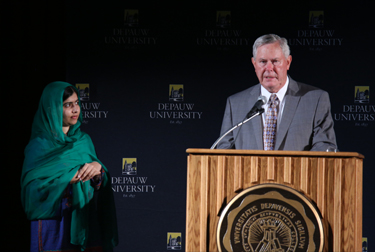 Malala was introduced by Tim Ubben, the 1958 DePauw graduate who, with his wife, Sharon, endowed the series which has "brought the world to Greencastle" for 31 years. Ubben asked the latest guest -- who will begin her college career at Oxford University next month -- if she had advice for her peers at DePauw.
Malala was introduced by Tim Ubben, the 1958 DePauw graduate who, with his wife, Sharon, endowed the series which has "brought the world to Greencastle" for 31 years. Ubben asked the latest guest -- who will begin her college career at Oxford University next month -- if she had advice for her peers at DePauw.
"My message to all of you is that you are so grateful to be studying in a great institution like this, where you get so many opportunities to learn, to meet people, to explore any field in life that you want, and to follow your dreams," Malala asserted. "And it is an opportunity that many children do not have, so be grateful for it and take as much advantage of it as possible. Learn from your teachers, learn from your fellows, learn from your own experiences an just keep on moving toward your dreams."
From the age of 10, Malala has campaigned for the rights of girls to receive an education. She wrote a blog, was interviewed by newspapers and for television, and was nominated for the International Children's Peace Prize by Bishop Desmond Tutu.
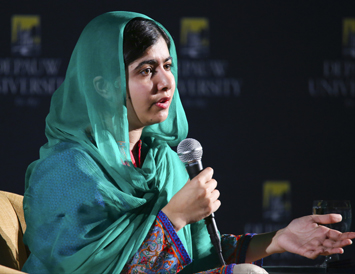 In October 2012, as a 15-year-old, Malala was shot and critically injured by the Taliban while traveling home from school on the bus with her friends. Following the attack, Malala was flown to the U.K.'s Queen Elizabeth Hospital, and by March 2013 she had made a remarkable recovery and was well enough to return to school. She has also become an international advocate for the right of every child to go to school. She founded the Malala Fund --which is dedicated to help promote education for girls throughout the world -- and in 2013 co-authored I Am Malala, an international bestseller.
In October 2012, as a 15-year-old, Malala was shot and critically injured by the Taliban while traveling home from school on the bus with her friends. Following the attack, Malala was flown to the U.K.'s Queen Elizabeth Hospital, and by March 2013 she had made a remarkable recovery and was well enough to return to school. She has also become an international advocate for the right of every child to go to school. She founded the Malala Fund --which is dedicated to help promote education for girls throughout the world -- and in 2013 co-authored I Am Malala, an international bestseller.
She spent this summer on a "Girl Power" tour of Africa, North America, the Middle East, Latin America and Europe. "It's just been incredible listening to the stories of the girls of what they have gone through and how they have fought against all the barriers in their community," Malala told the near-capacity crowd that packed Neal Fieldhouse tonight.
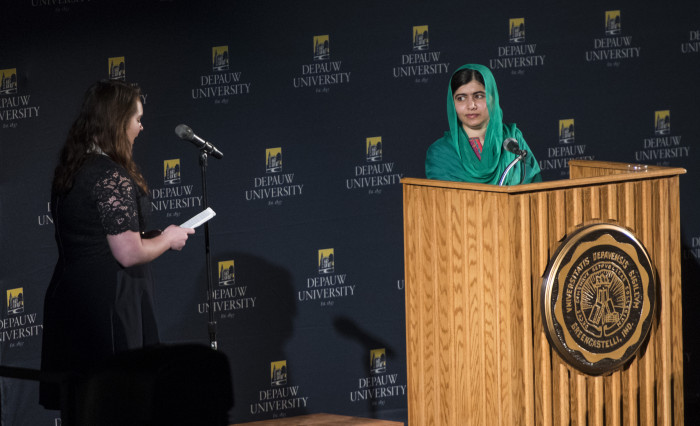 She also argued that culture is often a more important force that religion in keeping girls from school. "Education is really important in Islam: it is about learning, it is about learning about the world and making a positive change, and is the right of woman as well in Islam." Citing a discussion she said she had with her father on the drive to DePauw, Malala said, "In some societies it is not religion it is the patriarchy that is the big challenge; it is those cultural traditions that is a big challenge. Like even in our hometown in Pakistan, if you remove Islam and make them all non-Muslims they will have those challenges. So I think Islam is not the big issue, it's more about the cultural norms and traditions that is stopping women from getting their rights, from getting their education -- and I think for that, they need examples, they need role models."
She also argued that culture is often a more important force that religion in keeping girls from school. "Education is really important in Islam: it is about learning, it is about learning about the world and making a positive change, and is the right of woman as well in Islam." Citing a discussion she said she had with her father on the drive to DePauw, Malala said, "In some societies it is not religion it is the patriarchy that is the big challenge; it is those cultural traditions that is a big challenge. Like even in our hometown in Pakistan, if you remove Islam and make them all non-Muslims they will have those challenges. So I think Islam is not the big issue, it's more about the cultural norms and traditions that is stopping women from getting their rights, from getting their education -- and I think for that, they need examples, they need role models."
Yousafzai challenged her audience to join in the campaign to provide equal educational opportunities to all the children of the world. "If you keep on speaking, if you keep on challenging, it has to change," she said to applause. (at right: Malala as Tim Ubben '58 introduces her)
Malala called Islamophobia "disappointing," noting that after seeing white supremacists on television one could gather that "all of America is like this -- but that's not true; that's not what the whole America is like."
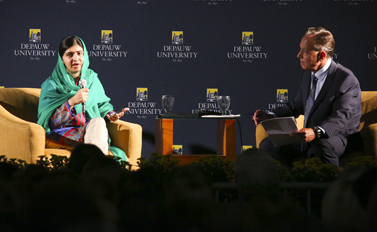 In a conversation moderated by Jeffrey T. Kenney, Walter E. Bundy Professor of Religious Studies at DePauw, she added, "I would say that more Muslim leaders need to be outspoken against extremists and they need to unite ... and say these extremist-minded people are not from us," to more audience applause.
In a conversation moderated by Jeffrey T. Kenney, Walter E. Bundy Professor of Religious Studies at DePauw, she added, "I would say that more Muslim leaders need to be outspoken against extremists and they need to unite ... and say these extremist-minded people are not from us," to more audience applause.
Poverty and war zones such as Afghanistan breed terrorism, Malala said. "Just sending troops in, fighting against the terrorists and using weapons is not the solution. We have to educate the future generations of the Middle East, of those regions, so we can protect them in the long term ... If you want to fight extremism in the long run, you have to invest in quality education for all children."
Asked by Dr. Kenney if she had her eye on someday becoming prime minister of Pakistan, Malala said, "I think in Pakistan, looking right now, for democracies to survive and to be strong it is very hard. And you have to be 35 years old, minimum," she said, as the crowd laughed, "so I still have time."
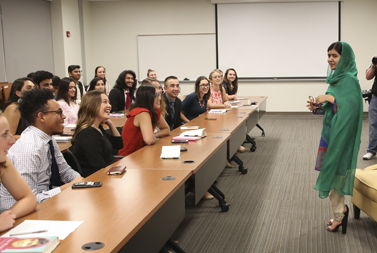 She continued, "I'm not planning to be prime minister and I just want to -- all I want to do -- is work in Pakistan to make sure that every Pakistani girl and boy can go to school and to bring change, to bring awareness, and to make it better. You don't have to be prime minister to do that."
She continued, "I'm not planning to be prime minister and I just want to -- all I want to do -- is work in Pakistan to make sure that every Pakistani girl and boy can go to school and to bring change, to bring awareness, and to make it better. You don't have to be prime minister to do that."
The crowd erupted with an extended cheer when she referred to her disappointment at "prime ministers and presidents around the world not doing much" to promote peace.
Malala also drew some hearty laughter when she discussed having to read some 20 books over the summer in preparation for her first semester at Oxford ("It's holiday," she said with mock exasperation). She also described herself as "a bit funny at home. And when it comes to my brothers, I'm like, I have no sense of human rights, I have no sense of respect, no sense of tolerance ... I am like a typical big sister."
After her conversation with Professor Kenney, Malala took questions from DePauw student journalists. They presented queries that were submitted via the internet, including one asking for her take on journalists. "Overall, I think supporting them is right, and if something wrong is happening you correct it rather than just calling everything fake news."
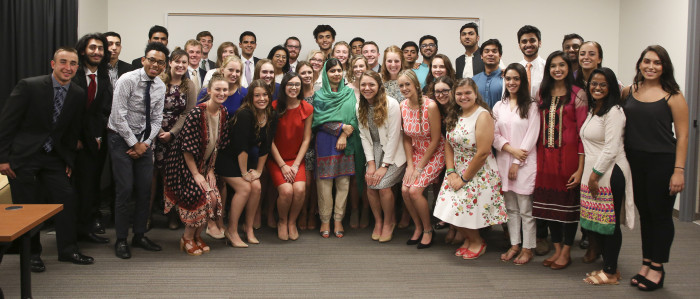 Asked about the escalating tensions between North Korea and the United States, Yousafzai offered, "I'm not an expert in these things but I would say that any decision that is taken should be taken carefully. They should also look at the long term impacts, the long term effects, and what change could it create. I do not support wars, and I think war should be prevented as much as possible and we should find ways through dialogue to solve the issues ... I hope the president can find a good solution to this."
Asked about the escalating tensions between North Korea and the United States, Yousafzai offered, "I'm not an expert in these things but I would say that any decision that is taken should be taken carefully. They should also look at the long term impacts, the long term effects, and what change could it create. I do not support wars, and I think war should be prevented as much as possible and we should find ways through dialogue to solve the issues ... I hope the president can find a good solution to this."
In April of this year, Malala was named named the youngest-ever United Nations Messenger of Peace.The 20-year-old tonight became DePauw's youngest-ever Ubben Lecturer. Yeonmi Park, who told her harrowing story of escaping North Korea, came to DePauw in October 2015, the day after her twenty-first birthday.
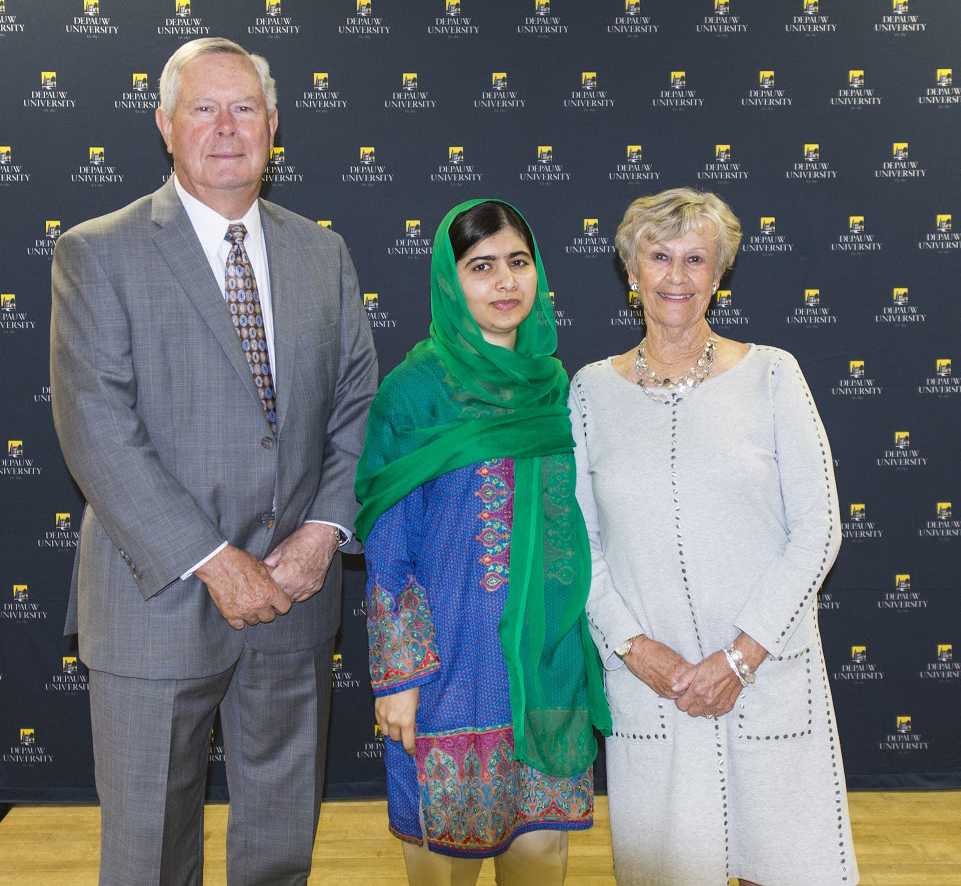 Anticipation for Malala's Ubben Lecture was great; a line began forming at noon and by 5 p.m. extended for almost two blocks.
Anticipation for Malala's Ubben Lecture was great; a line began forming at noon and by 5 p.m. extended for almost two blocks.
Malala's visit to DePauw included a class with 40 students from different disciplines. Before she left the stage at Neal Fieldhouse to the last of several standing ovations, she told the crowd, "I think the most important thing that we personally can do is to be good ourselves; is to make sure that at least we are not the bad ones and that we try to be patient, we try to be tolerant, we try to be kind towards each other, respect each other, and try to help as many people as possible and live with the purpose of helping others."
She declared, "As long as I am alive and I have the energy I will help people in any way possible, so I hope you will join me in this."